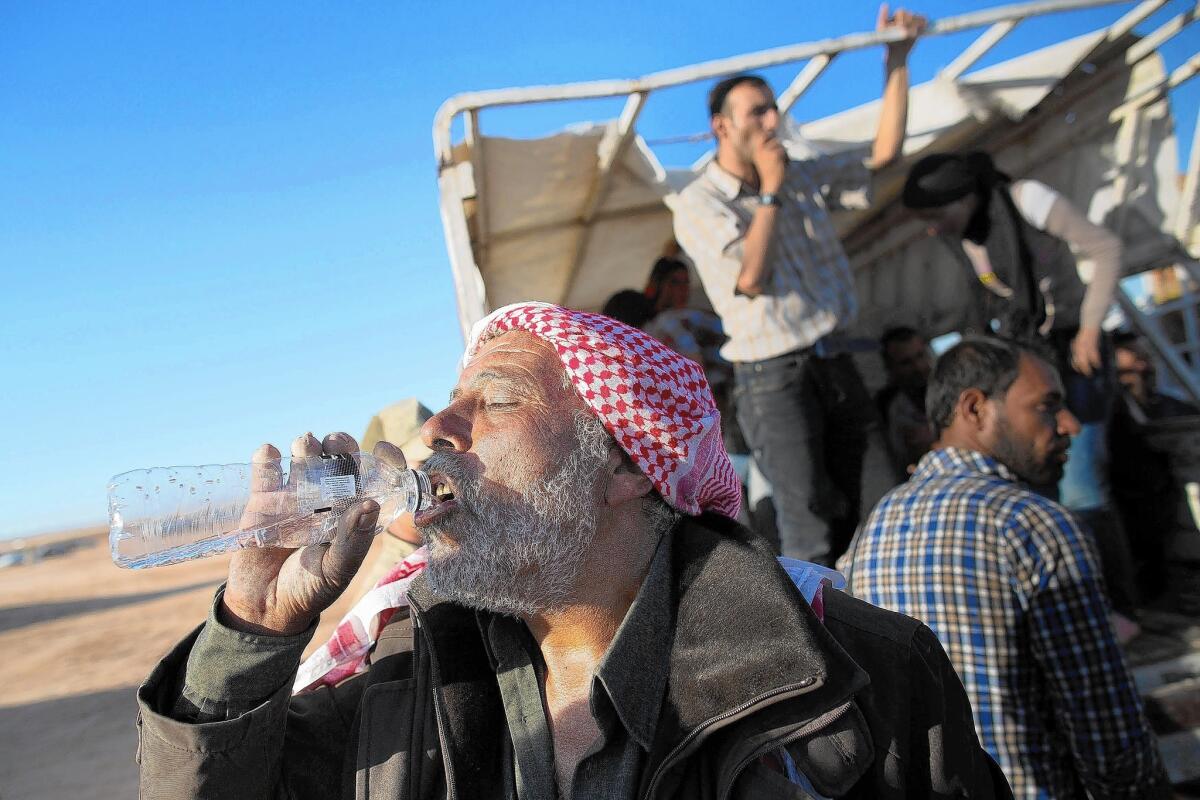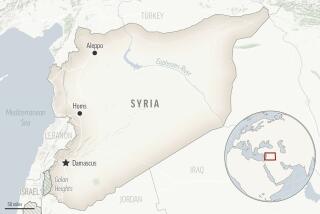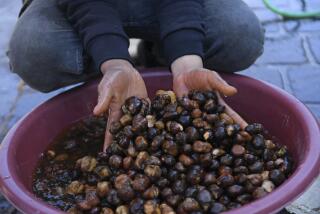Syrian Kurds in Turkey watch militant onslaught across border

The crowd scanned the opposite side of the valley, looking for signs of movement across the border in the Syrian town of Ayn al-Arab, known as Kobani to its mostly Kurdish inhabitants.
“I’ve been coming here every day,” a 40-year-old man who goes by the nickname Abu Mohammad said as he peered toward his hometown less than a mile away. “What else am I going to do? At least this way I get to smell its earth.”
For two weeks Kobani has been the site of intense clashes pitting its lightly armed Kurdish defenders against the well-equipped fighters of the militant group Islamic State, previously known as Islamic State of Iraq and Syria, or ISIS. Syrian government forces pulled out from the town a long time ago.
More than 150,000 residents, mostly Syrian Kurds, have fled to Turkey. They fear an “ethnic cleansing” campaign by the Islamic extremists, who view the Kurds as implacable adversaries. The satellite trucks of foreign news international media have descended on this parched, isolated stretch of border.
The mass exodus has rendered Kobani a ghost town, the occasional puff of smoke from artillery fire and the periodic echo of gunfire the only indications of life.
Militant forces are massed on the east, west and south of town. Few doubt that a full-fledged offensive will come soon, despite U.S. bombing strikes on Islamic State positions in the area. The Pentagon on Wednesday confirmed three more airstrikes near Kobani, destroying a militant artillery piece, armed vehicle and tank.
But the piecemeal aerial assaults have done little to alter the basic calculation of battle, Kurdish activists say. Islamic State fighters have dispersed to avoid becoming targets from above, the Kurds say. However, they have not pulled back and, in some cases, have moved into built-up areas on the outskirts of town.
On Wednesday, the militants boasted on the Internet of their advance on Kobani, uploading high-resolution images purporting to showcase their array of heavy weapons: cannons, mortars, even tanks.
With little else to do, many Kurdish refugees are daily drawn to the border to observe the unfolding chaos just across the barbed wire fences and occasional trenches marking the international boundary. Some onlookers pass binoculars to one another. Mostly, they squat, smoke cigarettes and observe.
Some have followed skirmishes and cheered as Kurdish fighters have repelled militant thrusts. But many Kurds have become passive witnesses to the destruction of their homes and other property.
In the Turkish village of Devmas, just north of the border, refugees watched helplessly Wednesday as armed Islamic State militants in black and camouflage fatigues stole their cars left on the Syrian side. The extremist forces could be seen breaking car windows and jump-starting the vehicles, confident no one would stop them.
The scene unfolded under the gaze of Turkish police in full riot gear, unable to do anything to thwart the mass thefts on Syrian territory.
A man who goes by the nickname Abu Ahmad, 42, watched the systematic grand theft auto. “We’re sitting here watching these guys come, break the [car] windows in the front, and take off with our cars,” he said.
Many Kurds are outraged that Turkish forces massed here with tanks and armored vehicles have done nothing to intervene against the militants across the border. They accuse Turkish forces of colluding with the extremists, a charge denied by the Turks.
The mistrust is mutual, fed by decades of ill will between Turks and Kurds.
The Turks view the Kurdish militiamen holding off the extremists across the border as local affiliates of the Kurdistan Workers Party, or PKK, arch-enemy of the Turkish government. Turkey and the PKK have been engaged in an often-bloody, three-decade conflict.
The Turks are preventing Kurdish volunteers from crossing back into Syria to help defend Kobani. Kurdish communities worldwide have been urging solidarity with the town, prompting volunteers to converge on the area.
Some Kurds say they are keeping a close eye on Turkish forces to be sure they don’t collaborate directly with Daesh, as Islamic State is known in Arabic.
“We’re here to be guards at the border, because we believe that the Turkish army is aiding Daesh,” said Farad Anik, a man with bushy eyebrows who said he had been coming daily since Sunday to observe the Turkish actions.
For years, the government in Ankara has allowed its more-than-500-mile border with Syria to become a rear base, supply depot and logistics hub for Syrian rebels of all stripes, including radical Islamists.
The Turks’ open border policy has been instrumental in nurturing the uprising against Syrian President Bashar Assad, whom Turkish officials have called on to step down. But the policy has also helped facilitate the growth of Islamic State and other Al Qaeda-style groups. The Turks, responding to pressure from the United States and other quarters, say they have lately tightened border controls and refused entry to hundreds of suspected extremists.
But there are still questions about how much Ankara is willing to cooperate in the U.S.-led coalition against Islamic State. To date, for instance, Turkey has not given permission for U.S. warplanes engaged in the campaign over Syria to fly from Turkish bases.
“No terrorist, whether in Turkey or elsewhere, will receive any sympathy from us,” Turkish President Recep Tayyip Erdogan assured the nation’s parliament Wednesday. “Their presence is not acceptable.”
In Devmas, Turkish riot police watching the assembled Kurdish refugees Wednesday began filing into a nearby bus. But they warned the Kurds to depart the area within an hour or risk forcible removal.
As the bus pulled out, Kurdish men using bandannas as makeshift masks began kicking and punching the vehicle. One masked figure tried to lob a large rock at the bus, but the stone plopped into a swirl of dust.
“If the Turkish soldiers had given us weapons, we could have shot five of those [Islamic State] fighters,” screamed one frustrated Kurdish man, punching the air with anger. “Five!”
Special correspondent Bulos reported from Zorave Mountain and Times staff writer McDonnell from Beirut.
More to Read
Start your day right
Sign up for Essential California for news, features and recommendations from the L.A. Times and beyond in your inbox six days a week.
You may occasionally receive promotional content from the Los Angeles Times.







